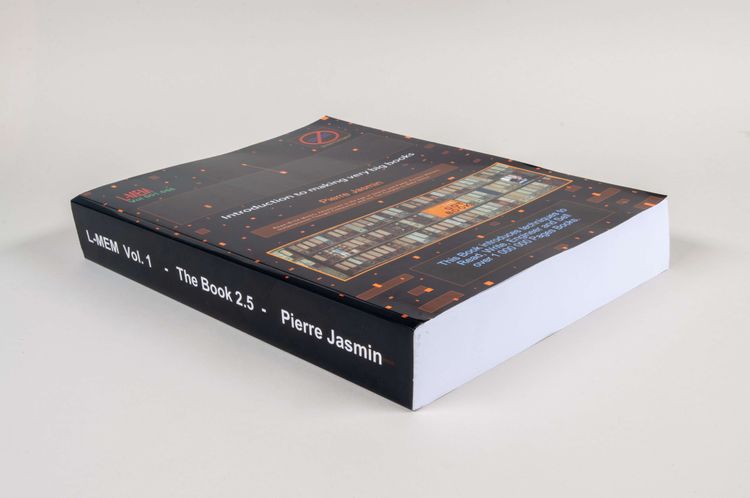L-MEM is a theoretical, speculative, and practical outline of how Pierre Jasmin sees writing and the medium of the book to be reconceptualized in the digital age and how that reconception will produce a new kind of literature in the not-too-far future. For this, he retraces the history of the book and publishing as well as of writing and information technology. The key concept is a networked, extensive production of knowledge in relation to what one human being can produce or perceive in a lifetime. In his speculative facets, Jasmin mostly follows the ideological traces of Silicon Valley Singularitarianism, yet with a distinct interest in the facilitation of knowledge filtered through a single human being, namely himself and his biography.
To tackle the increasingly diverging scales in the production and perception of knowledge, which are becoming a rupture due to digital information technologies, one has to confront oneself with aspects of content and time management. Not without humor, Jasmin suggests a system for reading and writing large amounts of text starting in a chapter called “Mom, why do I Need a Personal Documentation System?” He describes his working process of reading, writing, and editing several times throughout this book, with particular interest in how changes in tools make new methods and amounts of text possible, allegedly in different updates, with one working definition as follows:
“When I identify something that I consider insightful, I record it (annotate it, cut it,...) and pile it. Later, I process the pile (com-pile) and classify the notions and ideas into what largely amounts to ‘files, binders and boxes.’ Then it’s synthesized and incorporated into my production efforts. Once shared, it becomes imbricated with other works. This imbrication is the functional interface of different books (the inter-book), how stuff interconnects, the trans-existence in different forms, formats, media eventually permitting a fair appropriation, a process by which one can assemble a Book that matters at low-cost (and low-energy). Not at zero-cost but at a lower cost then scavenging the shelves of a real library and cut and pasting printed book fragments” (L-MEM, p. 29).
The book itself performs some of the theorems and practices Jasmin envisions, as what might be called a library-sized metabook. This mostly describes the fact that the book has a wiki as its source, which is editable, extendible, and in theory inexhaustible—by him and his readers. Also, the text includes versioned rewritings, extensive citations, appropriations, collective writing, and reproductions of discussions happening in digital comment sections of the project. In order to contribute to the wiki, a password was required, which could only be obtained when purchasing the book: “If you have a printed version of the Book, then the password is in the book in the section about Passwords. This password will allow you to Add Pages to this Wiki” (L-MEM Wiki, “Vol 1 – v053 – Aux Book Features”). A corresponding reference is hidden on page 270.
L-MEM exports a snapshot of this digital text, which Jasmin used to regularly rewrite and extend for several years until volume 001.058, which refers to volume 001 of the project in a 58th edition that was exported as a print-on-demand tome. Jasmin also lends one entire chapter to the production method, and to transferring and archiving large amounts of digital content in general in his chapter “Budgeting Printing the Book and Shipping it to You.”
